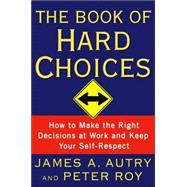
JAMES A. AUTRY was president of the magazine groups for Meredith Corp. and is the author of six books, including The Servant Leader, Real Power, and the bestselling Love and Profit. He is currently a consultant with top corporations and a popular lecturer on business ethics. He lives in Des Moines, Iowa. PETER ROY is the former president of Whole Foods Market, which Fortune magazine named one of the “Top Companies to Work For” during his tenure. He is now strategic advisor to a private equity firm and chairman of the National Outdoor Leadership School. He lives on Pawley’s Island, South Carolina.
| Introduction : the aspects of integrity | p. 1 |
| Look the other way or face down the corruption? | p. 9 |
| Fire someone you really like or do her work yourself? | p. 25 |
| Say no to your biggest customer or give up on fairness? | p. 31 |
| Do the right thing immediately or postpone it for the greater good? | p. 43 |
| Go for the quick fix or teach values first? | p. 55 |
| Do what everybody's doing or do what you know is right? | p. 65 |
| Go for the next big job or return to the quiet life? | p. 73 |
| Take responsibility or rationalize your mistakes? | p. 83 |
| Be a manager or be a minister? | p. 93 |
| Have courage for a noble cause or surrender to anger and threats? | p. 101 |
| Tell the public everything or suppress the news? | p. 109 |
| Intervene on behalf of the employees or tolerate an executive bully? | p. 121 |
| Quit your job or support a lie? | p. 129 |
| Stick to the vision or go for the money? | p. 137 |
| Stay with high quality and high cost or cut the quality and lower the costs? | p. 149 |
| Project your career or do your duty? | p. 159 |
| Do the hard right or settle for the easy wrong? | p. 169 |
| Support a colleague or think only of yourself? | p. 179 |
| Go along and get along or rescue the company culture? | p. 183 |
| Fix the management problem or protect your social standing? | p. 195 |
| Live your faith or give in to marketplace pressure? | p. 201 |
| Extend yourself or defend yourself? | p. 211 |
| Choices the authors made | p. 225 |
| Afterword : hard choices aren't about doing, they're about being | p. 241 |
| Table of Contents provided by Blackwell. All Rights Reserved. |
The New copy of this book will include any supplemental materials advertised. Please check the title of the book to determine if it should include any access cards, study guides, lab manuals, CDs, etc.
The Used, Rental and eBook copies of this book are not guaranteed to include any supplemental materials. Typically, only the book itself is included. This is true even if the title states it includes any access cards, study guides, lab manuals, CDs, etc.
Excerpted from The Book of Hard Choices: How to Make the Right Decisions at Work and Keep Your Self-Respect by Peter Roy, James A. Autry
All rights reserved by the original copyright owners. Excerpts are provided for display purposes only and may not be reproduced, reprinted or distributed without the written permission of the publisher.